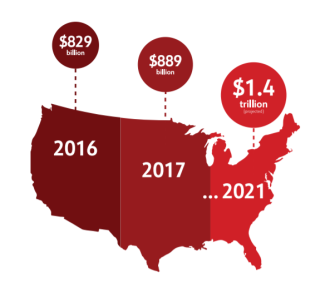The e-commerce sector is now developing with emerging technologies to improve the user experience and customer buying experience. Did you ever think of checking what will be the overall process and the efforts that go behind delivering the one product that you purchased from Amazon or Flipkart?
Let’s emphasize on 3 key factors in the enterprise e-commerce industry –
1. Enterprise E-commerce Growth trends
2. E-commerce technology shifts
3. Online Marketplace dominance
The future of e-commerce will be a boon to the consumers, considering the evolution and developments that have taken place in the enterprise B2B e-commerce segment. From offering custom data-based solutions, then platform-based enterprise solutions, and now cloud-based data technology solutions, the e-commerce industry is sure to be at an advantage. The concept of Software-as-a-service (SaaS), used by several e-commerce platforms, is now increasingly helping towards operational efficiency and robust workflows.

Image Courtesy – McFadyen Digital
Once upon a time, e-commerce industry was focused on providing customized services and solutions as per their customer’s needs. Now, it provides high-quality services with the help of cloud-based data technology, with time and cost-efficiency. The quality of enterprise product and service offerings has now developed within the Business to Business spectrum (B2B). Product benefits such as Application Program Interface (API) perform an integral role and prove to be a value–proposition.
In a global context, Bank of America presented the growth in the enterprise e-commerce spectrum by conveying a financial figure to be of 1.4$ trillion in 2021. Their research conveys the increase in financials, which is noticed from the year 2016 to 2021. This conveys the developments in the enterprise e-commerce domain and proves that companies are not only focused on their high-quality products and services. But also, the e-commerce companies are focused on upgrading the customer experience and making it delightful.
Let’s think of the bigger picture or the future. Professionally, where do you see yourself in the next 10 years? Get an interesting overview of the upcoming technologies, trends, and developments that enhance the enterprise e-commerce spectrum in the next 10 years –
- Headless Architecture –

Image Courtesy – McFadyen Digital
The headless architecture, in simple words, which is the website design, web architecture or kind of web layout, provides a valuable user experience as a content management system. The UI or User Interface helps in the provision of an enriching user experience. This kind of website architecture in e-commerce and backend functionalities or technologies provide more working speed, improves appearance and user experience.
- Microservices Architecture –
This architecture or operational model includes a group of services together to facilitate successful product purchases. This kind of architectural model or operational model provides reliability, flexibility to adapt to the changing business needs, and resolves all challenges that were previously found in the out-dated operational model. Also, it helps in the successful delivery of large applications.

Image Source – McFadyen Digital
3. Cloud Data Technology –
Another upgraded method using this technology, will be a cloud-based data technology platform for a specific purpose, that caters to a niche audience can be preferred. This can be used as a pilot program, after doing R&D and considering factors such as timeline, duration, cost, feasibility as to whether it will serve the business purpose or not. The benefits of cloud-based data technology platform also enable IT professionals, to launch a direct to consumer website or an altogether new online shopping website.
Enterprise e-commerce business is now going to the next level with more technologies that can help build robust, reliable and high-quality e-commerce solutions. These technologies will also help in speeding up of the workflows, operations, and overall business, along with product and service offerings.
The ideal e-commerce platform for your business will help in achieving milestones and set achievable business aims for the future. Your enterprise e-commerce platform will help you in aligning your business goals and will help you in achieving them. According to your future goals, you can select your e-commerce platform considering the cost to grow and cost to upgrade.
If an enterprise e-commerce platform is compatible, ready for future business needs and flexible with your business workflows then it would be an added advantage. Flexibility and Future-Proof will be benefits that such enterprise e-commerce platforms provide.
Certain key factors to check for before selecting the ideal e-commerce enterprise platform –
- The reviews, expert opinions about a product, the market understanding about a product
- The condition of Application Program Interface (API) that will help in facilitating integration or connection with the back end business
- The level and extent of the security it provides. The data within the enterprise e-commerce platform should be safe
- Platforms should also be analyzed for their stability, scalability, reputation of the product provider and consideration of best documented APIs.
One added advantage and benefit is that the ideal enterprise e-commerce platform will help businesses to provide service to new customer range, build more revenue mediums, and provide value to consumers buying the product or service.
Cloud-based data technology will help enterprise e-commerce businesses in terms of being future proof, time, cost, with rapid deployment. The technology investment decisions should be made post deciding business goals and objectives. These new platforms, new architecture, new models of enterprise e-commerce operations will provide secure pathways to progress. Technology will safely help towards the achievement of your business goals. Considering the fact that over 90% of businesses today have digital transformation strategies, an ideal enterprise e-commerce platform will help towards business development and achieving business goals.
Finally, the B2B e-commerce domain and cloud-based data technology are technologically compatible and are causes for several developments in the e-commerce spectrum.